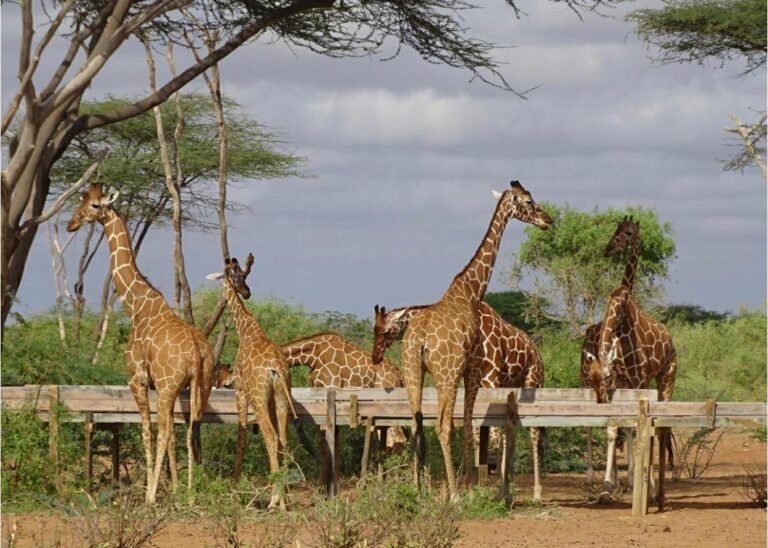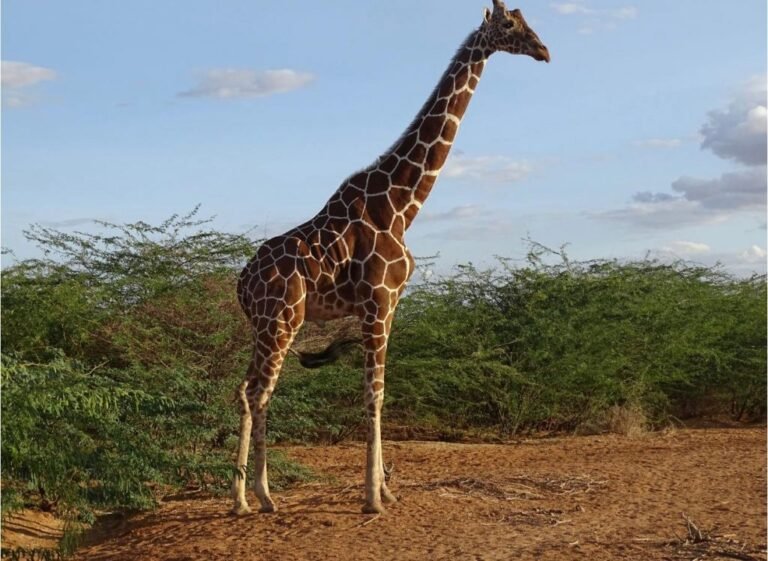Droughts can have devastating impacts on wildlife and agriculture, causing crop failures, food shortages, and increased food prices. They can also lead to water shortages, which can impact wildlife, human health, hygiene, and sanitation. Climate change is a global issue that requires urgent action to mitigate its effects, including reducing greenhouse gas emissions and developing more sustainable and resilient farming practices.
Wild At Life Project
Saving Giraffes in a Time of Drought
Activity status: Ongoing
Area of Activity: Garissa County, Kenya
Climate change is causing droughts to become more frequent and severe in many regions of the world. As temperatures rise, evaporation increases, leading to drier soils and reduced water availability. Additionally, changes in precipitation patterns are causing some areas to receive less rainfall, exacerbating the problem.
Species
The reticulated giraffe is officially listed as endangered. IUCN Red List estimates there are about 15,000 reticulated giraffes left in Africa. Of course, all other wildlife and livestock are suffering terribly from droughts.
Situation
Northeast Kenya is facing a severe drought, causing endangered giraffes in the area to suffer, even dying from dehydration and starvation. The situation is beyond sad. We are right in the middle of what should be the rainy season in Kenya, but it is unusually dry. The amount of water available to wildlife has been massively reduced, and the few remaining water sources are being dominated by herders for their livestock, driving away giraffes. The trees have stopped producing leaves, so there is less food for giraffes as well. It is even more difficult on new mums, where their milk has dried up, leaving little to none for their calves. Without their only source of food and nutrients, weak calves are left behind as they struggle to keep up.
Partners
- Save the Giraffes
- Somali Giraffe Project
- Local Conservancies
Working with local partners, Wild at Life e.V. and Save the Giraffes are
- Providing food – people are gathering acacia seed pods to feed giraffes, and we are also purchasing food pellets
- Providing water
- Trying to care for and nurture orphaned calves
Garissa and Wajir are among the biggest counties in Kenya by area size. Most of the giraffes have no access to the river which is just in Garissa. The giraffes are responding well to the acacia pods and we want to scale up this effort and establish hundreds of temporary feeding stations of pellets across the range.
The majority of the herds are young at this time of the year and are very vulnerable to drought. We have seen cases of abandoned calves and we are rescuing as many as possible.
A relief to these beautiful creatures
Wild at Life e.V. is seeking funds to support on-the-ground teams working across the drought-stricken region to supply water and food and to gather seed pods for the hundreds of dehydrated and starving giraffes until the rains come.
No results found.
This project is carried out in the following activity areas
Spread the news!
Help us increasing social commitment in saving endangered wild species. Express your support by sharing this article in your favorite social media channel.
Facebook
Twitter
LinkedIn
Pinterest
WhatsApp
Email
Most recent news
News
July 23, 2024
We recently rescued a baby waterbuck from a dangerous situation. This little girl was caught in a snare, which is a trap often set by poachers. Snares are very dangerous because they can hurt or kill any animal that gets
Project update
July 15, 2024
Yesterday, was World Chimpanzee Day, a moment to celebrate these incredible creatures and raise awareness about their plight. Chimpanzees, our closest living relatives, are facing numerous threats that have pushed them to the edge of extinction. At Wild at Life
News
July 13, 2024
We are pleased to share a blog post by our Advisory Board Member, Dr. Simon Buckle, published on the British Ecological Society’s Climate Change Ecology blog. He discusses the impact of net-zero goals on climate change, biodiversity, and human well-being.
News
July 9, 2024
The Crisis Facing Pangolins Pangolins, unique creatures that look like a mix between an aardvark and an armadillo, are the most trafficked mammals in the world. They are illegally hunted for their scales, which are in high demand on the
News
June 26, 2024
We are thrilled to share some fantastic news with you! Our very own Founder and Chief Conservation Officer, Asli Han Gedik, has been appointed as a Technical Advisor for the global initiative “End Wildlife Crime”. This exciting appointment shows Asli’s
Project update
May 30, 2024
We are pleased to share a positive update on the situation involving the pigs from the neglected slaughterhouse in Sachsen-Anhalt. Our team successfully rescued the nine surviving pigs, ensuring they received immediate veterinary care and a safe, nurturing environment.
Stay informed!
Subscribe to our newsletter to keep up to date with our activities!
By subscribing you consent to our Privacy Policy








